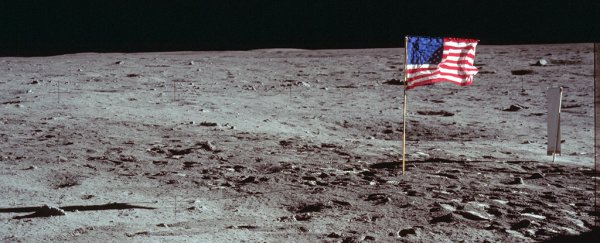Once again, the Trump administration has pledged to restore America's leadership in space by teaming with the private sector and returning to the moon.
Speaking at a White House ceremony Monday, President Trump offered high ambitions, but few specifics in signing a new space policy directive that had no timeline and promised no funding for future missions.
With Apollo astronaut Harrison "Jack" Schmitt in attendance on the 45th anniversary of Apollo 17's landing on the moon, Trump said NASA would not only return to the lunar surface but use it as a stepping stone to explore even deeper into the cosmos.
"The directive I'm signing today will refocus America's space program on human exploration and discovery," he said.
"It marks an important step in returning American astronauts to the moon for the first time since 1972 for long-term exploration and use. This time, we will not only plant our flag and leave our footprint, we will establish a foundation for an eventual mission to Mars and perhaps, someday, to many worlds beyond.
"This directive will ensure America's space program once again leads and inspires all of humanity."
His remarks mimicked those by Vice President Pence in October when he said in reconstituting the National Space Council: "We will return American astronauts to the moon, not only to leave behind footprints and flags, but to build the foundation we need to send Americans to Mars and beyond."
The policy directive marks the official reversal of the Obama administration's plan to visit an asteroid and fly to Mars by the mid-2030s. It also makes it clear that the Trump administration wants to explore the moon in partnership with the private sector and other countries.
The directive says that "the moon is of interest to international partners and is within reach of America's private space industry."
Moon Express, which intends to launch a robotic lander to the moon's surface as early as next year, and Lockheed Martin, which is building the Orion crew capsule for NASA, praised the announcement.
As did industry groups the Coalition for Deep Space Exploration and the Commercial Spaceflight Federation, whose president Eric Stallmer said that commercial companies have "invested hundreds of millions of dollars in private capital to develop innovative capabilities for lunar transport, operations and resource utilisation."
But presidents have promised Apollo-like ambitions for generations, and Trump is now the third consecutive Republican president to vow a return to the moon.
Both George H.W. Bush and George W. Bush gave lofty speeches about space exploration, and President Obama promised a "journey to Mars." But a lack of funding and a clear, sustained direction has hampered those efforts, for decades preventing any human exploration beyond low Earth orbit.
While Trump offered scant specifics about how NASA would return to the moon, or how much such an endeavor would cost, the difference this time is that his administration would attempt to leverage the growing private sector for the mission.
In addition to Moon Express, several commercial companies, including the United Launch Alliance, SpaceX and Blue Origin have announced plans to return to the moon.
"This is very different than what happened in previous major space efforts where it was really just governments," said Scott Pace, the executive secretary of the National Space Council.
"We want US industry to be leading, and we want to do it with our international partners."
Some think they will be the key that could give Trump a space triumph.
"For all of this goal-setting, the real test of Trump administration's space plan is simple: is it a giveaway to special interests, or an actual space strategy that will push us ahead," said Phil Larson, an assistant dean at the University of Colorado Boulder's college of engineering.
"We don't know the answer to that yet. But we do know a commercially-led approach is the best deal for US taxpayers. The moon is great, but the plans and partnerships matter more than dates and destinations."
2017 © The Washington Post
This article was originally published by The Washington Post.
